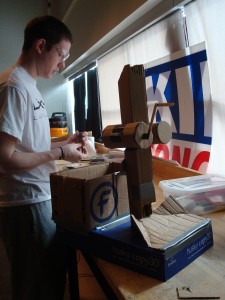
The goal of engineering is to improve lives by solving the world’s problems, and Iowa State’s College of Engineering believes it’s never too early to start thinking globally.
Several courses in the college require students to identify and find solutions to major issues in poverty-stricken countries. Students use the semester to research, plan, design, and even produce prototypes of their products.
Kate Kennedy, a sophomore in mechanical engineering, is part of a group in ME 270 working to prevent soil erosion in Tanzania. Her group—which includes TC Ringgenberg, Emily Whitemarsh, Max Bramer, and Eric Johnson—began talking with people who had visited Tanzania to gain more information on the country.
The group noticed that the majority of Tanzanians are subsistence farmers, so the team chose to target farming for their project. First looking into building a hand planter, the group found several on the market and realized that wasn’t the best direction to take. Erin MacDonald, assistant professor of mechanical engineering, encouraged the students to “dig deeper and find the real problem.”
That problem turned out to be soil erosion. Farmers in the country often clear off roots that hold down the soil, which also washes away the topsoil, taking important nutrients with it.
“In Tanzania, people live off what they grow,” says Kennedy, “so if their soil gets depleted, it’s a huge problem for them.”
Kennedy described her group’s project as a harvester that would be pushed around fields to spread mulch while leaving roots in the ground to compress the topsoil and contain its nutrients. “Ideally, the device would move through fields and cut and harvest the crop as well,” she says.
Due to time, budget, and size constraints, the group is only sampling the mulching part of its machine. And while the students wanted to do more with the project, Kennedy said a restricted budget provided a more realistic experience.
Even with only a few semesters under their belts, these projects help students gain an understanding of working with global customers, focusing on real-world problems, and creating new designs on a budget.
And while this and other courses across engineering aren’t necessarily developed for selling, they are always designed with actual uses in mind. “The different technologies we are developing have the potential to get marketed because there are some good ideas,” says Kennedy.
“It’s important that we are confronted with problems in developing nations at some point in our college career. It’s a good thing for young engineers to consider.”